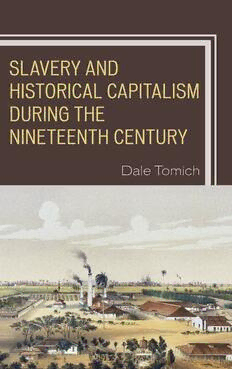
Slavery and Historical Capitalism during the Nineteenth Century PDF
Preview Slavery and Historical Capitalism during the Nineteenth Century
i Slavery and Historical Capitalism during the Nineteenth Century Slavery and Historical Capitalism during the Nineteenth Century Edited by Dale Tomich LEXINGTON BOOKS Lanham • Boulder • New York • London Published by Lexington Books An imprint of The Rowman & Littlefield Publishing Group, Inc. 4501 Forbes Boulevard, Suite 200, Lanham, Maryland 20706 www.rowman.com Unit A, Whitacre Mews, 26-34 Stannary Street, London SE11 4AB Copyright © 2017 by Lexington Books All rights reserved. No part of this book may be reproduced in any form or by any electronic or mechanical means, including information storage and retrieval systems, without written permission from the publisher, except by a reviewer who may quote passages in a review. British Library Cataloguing-in-Publication Information Available Library of Congress Cataloging-in-Publication Data ISBN 978-1-4985-6583-7 (cloth : alk. paper) ISBN 978-1-4985-6584-4 (electronic) ∞ ™ The paper used in this publication meets the minimum requirements of American National Standard for Information Sciences—Permanence of Paper for Printed Library Materials, ANSI/NISO Z39.48-1992. Printed in the United States of America This book is dedicated to the memory of Anthony E. Kaye (1962–2017), our friend and colleague. Contents Introduction ix Dale Tomich 1 Why the Second Slavery? 1 Robin Blackburn 2 Slavery in Historical Capitalism: Toward a Theoretical History of the Second Slavery 37 Dale Tomich 3 Historical Slavery and Capitalism in Cuban Historiography 67 José Antonio Piqueras 4 Slavery in Nineteenth-Century Brazil: History and Historiography 123 Rafael Marquese and Ricardo Salles 5 The Second Slavery: Modernity in the Nineteenth-Century South and the Atlantic World 171 Anthony E. Kaye Index 197 About the Contributors 201 vii Introduction This book contributes to the renewal of the debate over slavery and capital- ism. The concept of the second slavery provides a perspective through which various historiographical traditions are brought are brought into relation to one another in the framework of Atlantic and world history. This approach at once recuperates older historiographies and proposes new problems and perspectives for future research and interpretation. The concept of the “second slavery” (see Tomich 2004) represents the attempt to account for the spatial and temporal specificity of the new frontiers of slave commodity production—cotton in the US South, sugar in Cuba and coffee in Brazil—during the period between the 1820s and 1888 when slav- ery was abolished in Brazil. These zones of the second slavery are of special interest because their development runs counter to prevailing interpretations of slavery in the Americas. They were formed as parts of a distinct cycle of economic and geographic expansion of the capitalist world-economy that transformed the Atlantic world. This cycle was a part of the world-economic processes of industrialization, urbanization and the restructuring of world markets. These three zones, which had been relatively marginal during the eighteenth century, turned into dynamic poles of the expansion of slavery to meet the growing world demand for cotton as an industrial raw material, and sugar and coffee for consumption by working and middle classes concen- trated in the urban centers of the North Atlantic. Their emergence established new commodity circuits that were firmly integrated into the emergent indus- trial division of labor. Thus, in contrast to colonial slavery, the new zones of the second slavery presupposed the existence of productive capital and competitive world mar- kets and were a condition for the reproduction of the latter. However, the formation of this new Atlantic division of labor was not just the result of ix
